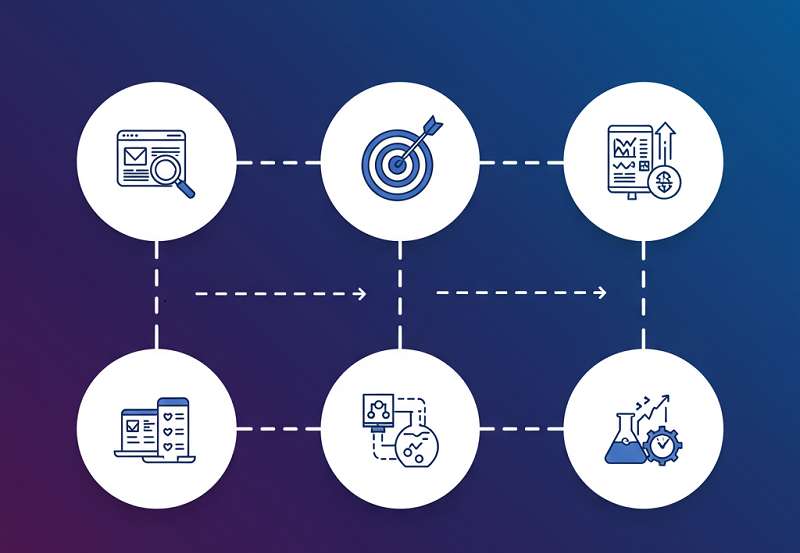Can SEO Be Automated? Complete SEO Automation Guide for 2025
The world of search engine optimization has become increasingly complex, with hundreds of ranking factors to consider and countless tasks that demand attention from SEO professionals daily. From technical audits to content optimization, keyword research to link building, the sheer volume of work can feel overwhelming. This complexity has led many marketers to wonder: can SEO be automated?
Yes, many SEO tasks can be automated, but not all. AI-powered tools save up to 50% of time spent on data analysis and interpretation, and keyword research time can be reduced by 90%, from 5 hours to 30 minutes. However, strategic planning, content creation, and relationship building still require human expertise.

Can SEO Be Automated? A Complete Guide to SEO Automation in 2025
What Is SEO Automation?
SEO automation is the use of software and tools to perform search engine optimization tasks with minimal human intervention. It involves setting up systems that can monitor, analyze, and implement certain SEO optimizations automatically.
Key Components:
- Automated monitoring of website performance
- Rule-based task execution (like meta tag updates)
- Data collection and reporting without manual input
- Alert systems for technical issues
SEO Automation vs. AI-Assisted SEO
| SEO Automation | AI-Assisted SEO |
|---|---|
| Follows predefined rules | Uses machine learning |
| Executes specific tasks | Provides recommendations |
| Minimal human oversight needed | Requires human decision-making |
| Best for repetitive tasks | Best for strategic insights |

Why Use SEO Automation? (Statistics & Benefits)
Market Growth Data
The global AI SEO software tool market is estimated to reach $4.97 billion by 2033 from $1.99 billion in 2024, showing massive industry adoption.
Time Savings Statistics
- 75% of businesses leverage AI to reduce the time spent on manual tasks like keyword research and meta-tag optimization
- Technical audits made 87.5% faster with AI tools
- 37% of marketers use AI to automate time-consuming SEO tasks
Business Impact
- 65% of businesses report better campaign results since they started adopting AI in SEO
- 91% of respondents reported that SEO positively impacted website performance and marketing goals in 2024
What SEO Tasks Can Be Automated? (Complete List)
Technical SEO Automation
Technical SEO presents some of the best opportunities for automation because it involves many routine, rule-based tasks that can be systematically monitored and executed.

1. Site Auditing and Monitoring
- What it does: Continuously crawls websites to identify issues
- How it works: Automated tools scan for broken links, duplicate content, missing meta tags
- Time saved: 80-90% reduction in manual checking
- Best tools: Screaming Frog, DeepCrawl, Sitebulb
2. XML Sitemap Management
- Process: Automatically generates and updates sitemaps when content changes
- Benefit: Ensures search engines discover new pages immediately
- Implementation: Most CMS platforms support automatic sitemap generation
3. Meta Tag Optimization at Scale
- Use case: E-commerce sites with thousands of products
- Method: Template-based systems using product attributes
- Result: Unique, optimized title tags and descriptions without manual writing
4. Schema Markup Implementation
- Automation scope: Product information, reviews, local business data
- Process: Auto-applies appropriate structured data based on page type
- SEO impact: Improves rich snippet opportunities
Content-Related Automation
While content creation itself remains largely a human domain, many content-related SEO tasks can be automated effectively.
1. Keyword Research and Clustering
- Capability: Identifies opportunities and groups related terms
- Speed improvement: 90% time reduction
- Output: Prioritized keyword lists with search volume and difficulty data
2. Content Gap Analysis
- Function: Compares your content against competitors
- Result: Identifies missing topic opportunities
- Automation benefit: Processes vast amounts of competitor data quickly
3. Internal Linking Optimization
- Process: Analyzes content themes and suggests relevant links
- Human role: Final review and approval of suggestions
- Impact: Improves site architecture and page authority distribution
Analytics and Reporting Automation
Data collection and analysis represent ideal automation opportunities, as they involve processing large amounts of information according to predefined criteria.
1. Rank Tracking
- Monitoring: Continuous keyword position tracking
- Alerts: Immediate notifications of significant changes
- Coverage: Multiple search engines and locations
2. Performance Reporting
- Data sources: Google Analytics, Search Console, third-party tools
- Output: Automated dashboards and scheduled reports
- Benefit: Real-time insights without manual compilation
3. Competitor Monitoring
- Tracking: Competitor rankings, content updates, technical changes
- Intelligence: Identifies market opportunities and threats
- Frequency: Daily or weekly automated checks
What SEO Tasks Cannot Be Automated? (Human-Only Zone)
Strategic Planning

Why automation fails here:
- Requires understanding of business context
- Involves subjective decision-making
- Needs industry expertise and market knowledge
Human-required tasks:
- SEO strategy development
- Competitive analysis interpretation
- Goal setting and prioritization
- Budget allocation decisions
Content Creation and Quality
Content writing limitations:
- AI lacks creativity and original insights
- Cannot understand nuanced user intent
- Struggles with brand voice consistency
- Missing industry expertise and authority
Quality control needs:
- Editorial oversight
- Fact-checking and verification
- Brand alignment
- User experience optimization
Relationship Building
Why humans are essential:
- Authentic relationship building
- Personalized outreach campaigns
- Community engagement
- Influencer partnerships
- Link building negotiations
How to Start SEO Automation (Step-by-Step Guide)

Step 1: Audit Current Processes
- List all SEO tasks you perform regularly
- Identify repetitive activities (reporting, monitoring, data collection)
- Calculate time spent on each task weekly
- Prioritize by automation potential and time savings
Step 2: Choose Your First Automation Project
Low-risk starting points:
- Automated rank tracking
- Weekly performance reports
- Technical issue monitoring
- Sitemap updates
Step 3: Select Automation Tools
| Task Type | Recommended Tools | Price Range |
|---|---|---|
| All-in-one platforms | SEMrush, Ahrefs, Moz | $99-$500/month |
| Technical SEO | Screaming Frog, DeepCrawl | $149-$300/month |
| Rank tracking | AccuRanker, Wincher | $49-$199/month |
| Content optimization | Clearscope, MarketMuse | $170-$500/month |
Step 4: Implementation and Testing
- Start with staging environment or limited scope
- Set up monitoring and alerts for the automated system
- Run parallel testing (automated vs. manual) for validation
- Document processes and create backup procedures
Step 5: Scale Gradually
- Monitor results for 30-60 days before expanding
- Add complexity only after mastering basic automation
- Maintain human oversight for critical decisions
SEO Automation Best Practices (Expert Tips)
Quality Control Measures
- Regular validation: Check automated outputs weekly
- Alert systems: Set up notifications for unusual results
- Human oversight: Review all automated changes before implementation
- Backup procedures: Have manual processes ready as fallbacks
Avoiding Over-Automation
- Maintain personalization in outreach and content
- Preserve brand voice in automated communications
- Keep strategic thinking human-driven
- Balance efficiency with effectiveness
Compliance and Safety
- Follow search engine guidelines in all automated processes
- Avoid manipulative practices at scale
- Maintain content quality standards
- Regular guideline updates as search engines evolve
Common SEO Automation Mistakes (And How to Avoid Them)
Mistake 1: "Set and Forget" Mentality
Problem: Assuming automation needs no monitoring
Solution: Schedule regular reviews and performance checks
Mistake 2: Over-Automating Outreach
Problem: Generic, obviously automated emails
Solution: Maintain personalization and human touch in communications
Mistake 3: Ignoring Algorithm Updates
Problem: Automated systems continue outdated practices
Solution: Regular strategy reviews and system updates
Mistake 4: No Quality Control
Problem: Automated errors compound over time
Solution: Implement validation checks and human oversight
The Future of SEO Automation (2025 Trends)
Emerging Technologies
AI and Machine Learning Integration:
- 19% of marketers plan to add AI in search to their SEO strategy in 2025
- Advanced pattern recognition in search data
- Predictive analytics for algorithm changes
Generative AI for SEO:
- Over 116.9 million Americans will use generative AI by 2025
- Automated content optimization suggestions
- Dynamic meta description generation
Industry Adoption Statistics
- 86% of SEO professionals are already using artificial intelligence in their workflows
- AI is used in 72% of content strategies to recommend SEO-friendly topics
Summary: SEO Automation Checklist
Tasks Perfect for Automation:
- Technical site monitoring
- Rank tracking and reporting
- XML sitemap updates
- Basic keyword research
- Performance analytics
- Competitor monitoring
Keep These Human-Driven:
- SEO strategy development
- Original content creation
- Relationship building
- Complex problem-solving
- Brand voice management
- Strategic decision-making
Success Metrics to Track:
- Time saved on routine tasks
- Accuracy of automated processes
- ROI improvement from efficiency gains
- Maintained or improved SEO performance
- Quality scores for automated outputs
Frequently Asked Questions
Q: What percentage of SEO can be automated?
A: Approximately 40-60% of routine SEO tasks can be automated, including technical monitoring, reporting, and basic optimizations. Strategic and creative work remains human-driven.
Q: Will SEO automation replace SEO professionals?
A: No. Google E-E-A-T (Experience, Expertise, Authoritativeness, and Trustworthiness) emphasizes the importance of delivering genuine value, which requires human expertise, creativity, and strategic thinking.
Q: How much time can SEO automation save?
A: AI-powered tools save up to 50% of time spent on data analysis and interpretation, with some specific tasks like keyword research seeing 90% time reduction.
Q: What's the biggest risk of SEO automation?
A: Over-automation leading to generic, low-quality outputs that don't serve user intent or maintain brand standards. Always maintain human oversight for strategic decisions.
Conclusion
SEO automation offers significant opportunities to improve efficiency and scale optimization efforts, but it's not a replacement for human expertise and strategic thinking. The most successful SEO strategies combine the efficiency of automation with the insight, creativity, and relationship-building capabilities that only humans can provide.
Remember that SEO automation is a tool to enhance human capabilities, not replace them. The most successful SEO programs will continue to rely on the strategic thinking, creativity, and relationship-building skills that make human expertise irreplaceable in the ever-evolving world of search engine optimization.





